
Irfan Habib

29 books












This book brings forth the general account of Indian economy in the first century of the British rule. It presents the current interpretations of the eighteenth century history, nature of tribute, drain of wealth from India to England, and the scope and problems of historical demography.
It discusses at length the condition of Indian economy before the British conquests, agrarian rights in late Mughal India, traditional agricultural practices in India, ...


Irfan Habib, Professor Emeritus at the Aligarh Muslim University and an acclaimed expert in the field of Indian history, here discusses the political and economic history of ancient India from 200 BC to AD 300, when the Indo-Greeks, Shakas, Kushanas and the Satavahanas dominated the political scene. This is a detailed survey of the important economic changes under them especially in craft production and overseas trade. Based on fully updated material, it includes ...

This book presents the most detailed mapping yet attempted of India during ancient times, from the arrival of man to c. AD 750. The text aims at providing substantiation, through adequate referencing, of what has been depicted on the maps. It also seeks to clarify many problems of archaeology and chronology that beset mapping of ancient India.
The character of the information varies, to a considerable extent, according to the nature of the sources available. ...
Increasing interest has been shown in recent decades in matters relating to ecology, especially under the influence of the debate on climate change. The scope of ecology is, of course, much wider than that of climate alone, and involves in addition not only human relation with all species of animals and plants but also those conditions of human societies (material and intellectual) that influence our responses to the opportunities and challenges posed by nature. ...

This book covers an important aspect of our history, on which no general work or textbook yet exists. It aims at covering the whole range of technology, from the tools and skills of ordinary men and women to the instruments of astronomers and the equipage and weaponry of war. A key element of the study is that it is essentially historical, that is, changes in technology are carefully traced and their consequences examined. Larger questions, such as those of ...
When first published in 1963, this classic work on Mughal India aimed at presenting a mass of critically analysed material on the agrarian conditions of precolonial India. This was a subject which, until then, had received little attention beyond a short though seminal monograph by moreland. Many findings in Habib's book, mainly with regard to administrative institutions and the position of zamindars, received general acceptance. Others, notably the thesis on ...

This volume is a part of the research and publication programme of the Indian History Congress to commemorate the tercentenary of the Khalsa. It presents translations of all major Persian sources of Sikh history up to 1765, when Sikh power was established over the Punjab. These sources offer details that are not otherwise available, and richly supplement the information preserved in the Punjabi (Gurmukhi) traditions. Yet, until now, most of the Persian texts ...

Prehistory by Irfan Habib describes the earliest ages of human life in India, long before the existence of written records. It is part of a larger project, a People’s History of India, but is also intended to stand alone as an independent monograph. In this monograph, as well as others in the series which will be published successively, the style is sought to be kept simple without making it popular, rhetorical or inexact. Use of technical ...

The present volume, State and Diplomacy under Tipu Sultan: Documents and Essays, edited and introduced by Irfan Habib, supplements Confronting Colonialism: Resistance and Modernization under Haidar Ali and Tipu Sultan, which was published in 1999 by the Indian History Congress as part of the Srirangapatnam bicentennial. The main object of this volume is not only to add fresh contributions to the papers collected in Confronting Colonialism, but also to present to ...
This volume originated in papers presented at a panel on the historical relationships between India and Iran, organized under the auspices of the Aligarh Historians Society at the 62nd session of the Indian History Congress, Bhopal, 2001. In the natural process of the development of national histories, there is the recurring danger that one’s grasp of the past could become so insular that many large movements which could not be restricted to ...

Confronting Colonialism: Resistance and Modernization under Haidar Ali and Tipu Sultan, a volume of essays edited and with an introduction by Professor Irfan Habib, commemorates the second centenary of Tipu's final battle against the British at Srirangapatnam in 1799. The essays, devoted to the history of Mysore under Haidar Ali and Tipu Sultan, include presentations made at the annual proceedings of the Indian History Congress since pre-independence days, as ...

The Vedic Age completes the first set of three monographs in the People’s History of India series. It deals with the period c. 1500 to c. 700 bc, during which it sets the Rigveda and the subsequent Vedic corpus. It explores aspects of geography, migrations, technology, economy, society, religion, and philosophy. It draws on these ordinary people, with special attention paid to class as well as gender. In a separate chapter, the major regional cultures as ...
The two volume Cambridge Economic History of India has served as the single most widely consulted and cited reference for over twenty years. This volume covers a spectrum of socio-economic views on, and reviews of c. 1200 – 1500, the pre-Mughal period. It begins at the point fro which a systematic treatment of Indian economic history becomes possible. It closes on the eve of the subjugation of the country and its economy by Britain. Twenty-seven essays in ...

Mauryan India, as part of the People's History of India series, covers the period from about 350BC to about 185BC, thereby encompassing the invasion of Alexander (327-325BC) and the history of the Mauryan Empire (c.354-185BC). There is a detailed account of the inscriptions of Ashoka and their significance. A picture of the economy, society and culture of the time follows, constructed out of the varied sources available, epigraphic, textual and archaeological. An ...

What India means may elicit different answers from people today. The answers that might have been given a thousand, two thousand or three thousand years ago would have been possibly quite different. This volume explores how notions of India have grown: even as a geographical expression the notion (under whatever name) took time to form. Political factors and cultural diffusion both helped in the formation. Nor is the role of outsiders in looking at India as ...

The monograph surveys the developments within the Indian economy during the period of the high tide of colonial domination between the 1857 Rebellion and the First World War. Its various sub-chapters deal with population, gross product and prices; tribute, the imperialism of free Trade and the construction of railways; peasant agricultural, plantations, commercialization of agriculture and its impact on rents, peasant incomes and agricultural wages; rural ...
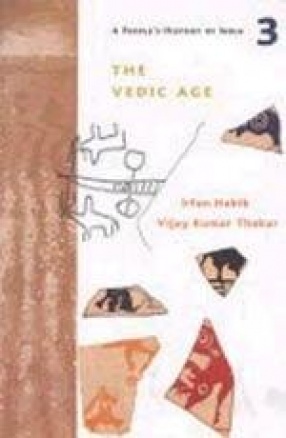
The Vedic Age completes the first set of three monographs in the People's History of India series. It deals with the period c. 1500 to c. 700 BC, during which it sets the Rigveda and the subsequent Vedic corpus. It explores aspects of geography, migrations, technology, economy, society, religion, and philosophy. It draws on these texts to reconstruct the life of the ordinary people, with special attention paid to class as well as gender. In a separate chapter, ...

The Indus Civilization by Irfan Habib is the second monograph in the people's history of India series. It continues the story from the point reached in the earlier monograph, prehistory. The dominant theme here is provided by the Indus civilization. In addition, other contemporary and later cultures down to about 1500 BC, and the formation of the major language families of India, are discussed. The Indus Civilization seeks to maintain uniformity with prehistory ...


